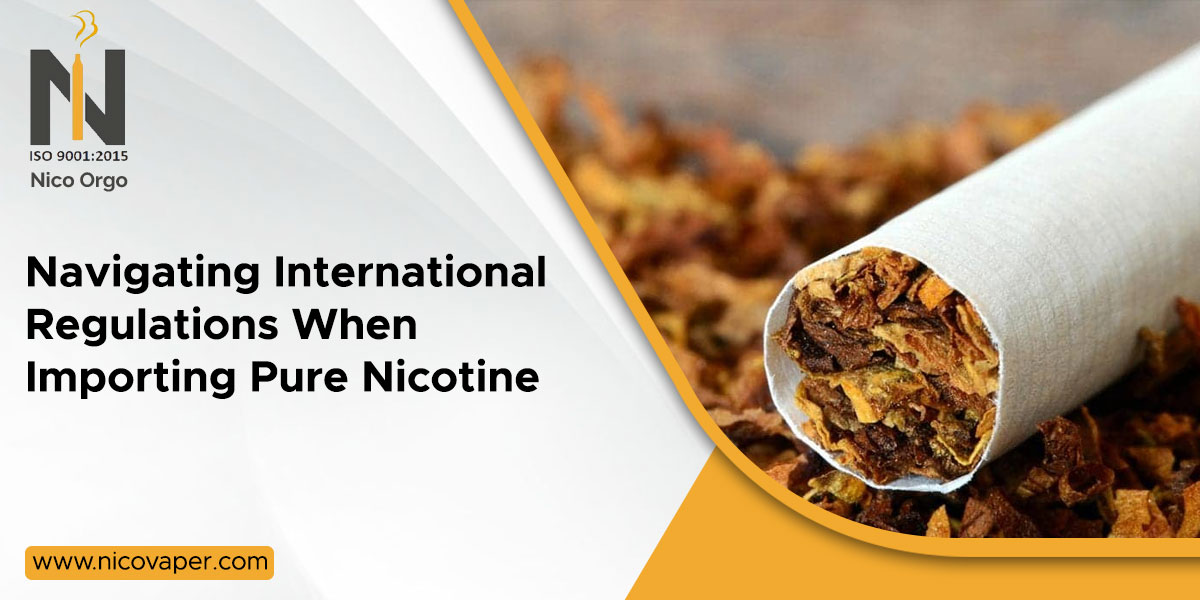


Pure nicotine has established itself as a fundamental component of nicotine replacement therapies, e-liquids, and other smoking cessation aides in the constantly changing global landscape of health-conscious lifestyles and harm-reduction alternatives. But while demand is growing, especially in the pharmaceutical and vape industries, the path to importing pure nicotine across borders is anything but straightforward.
At Nicovaper, we understand the complexity of navigating international regulations. As a Pure Nicotine Supplier committed to safety, compliance, and customer satisfaction, we help our global clients understand and overcome the maze of legal and logistical challenges involved in importing pure nicotine.
Let’s explore the key considerations, regulatory frameworks, and best practices for navigating this intricate process.
The Global Demand for Pure Nicotine:
Pure nicotine, especially pharmaceutical-grade, plays a pivotal role in products aimed at helping individuals transition away from combustible tobacco. With governments promoting smoke-free alternatives and consumers becoming more aware of health risks, the market has seen a sharp rise in demand.
However, the very characteristics that make pure nicotine valuable, its potency and rapid absorption, also make it subject to stringent regulation.
Pure Nicotine: Not Just a Commodity, But a Controlled Substance
Unlike other industrial chemicals, pure nicotine is not treated as a simple commodity. Its high toxicity, coupled with its pharmacological impact, places it under various national and international regulatory frameworks. Importing it isn’t merely about shipping and customs; it’s about compliance with chemical control laws, drug administration acts, and in some cases, poison control regulations.
Each country has its own take. Some classify it as a hazardous substance, while others regard it as a pharmaceutical intermediate or a tobacco-derived extract. And therein lies the first hurdle: classification discrepancies.
Understanding Regional Regulations:
Here’s how different regions manage the import of pure nicotine:
1. European Union (EU):
Under REACH (Registration, Evaluation, Authorisation and Restriction of Chemicals), pure nicotine must be pre-registered and accompanied by a Safety Data Sheet (SDS). Any supplier or importer must also comply with CLP (Classification, Labelling and Packaging) regulations, which ensure clear hazard communication.
In some EU countries, importing pure nicotine may require prior approval from health or environmental ministries. The Toxic Substances Registry must also be updated accordingly.
2. United Kingdom (UK):
Post-Brexit, the UK has developed its own set of chemical compliance rules under UK REACH. Importers must ensure substances are registered with the Health and Safety Executive (HSE). If the nicotine is intended for use in e-liquids, MHRA (Medicines and Healthcare Products Regulatory Agency) regulations will apply, particularly under the Tobacco and Related Products Regulations 2016.
3. United States:
The FDA categorises pure nicotine used in e-liquids or nicotine patches as a drug component or tobacco product. Importers must comply with FDA premarket authorisation (PMTA) or have adequate documentation proving the substance's intended use.
Additionally, the DEA monitors the import of highly concentrated nicotine due to its toxicity and potential for misuse.
4. Asia-Pacific:
Countries like Australia treat pure nicotine as a Schedule 4 poison, which means it can only be imported for medical use by licensed entities. In contrast, India, where Nicovaper is based, has clear guidelines on the production and export of nicotine derived from tobacco but mandates importers abroad to comply with local narcotic and excise norms.
Essential Documentation Checklist:
As a trusted Pure Nicotine Supplier, we always advise clients to gather the following documents when importing:
Having the right paperwork in place minimises delays, avoids confiscation at customs, and builds credibility with regulatory authorities.
Labelling, Packaging & Transportation:
It’s not enough to have the proper paperwork; how your pure nicotine is packaged and labelled can make or break an import. International regulations often demand:
Nicovaper ensures every shipment complies with international shipping norms, whether it's air freight, sea freight, or road transport.
Partnering with a Reliable Pure Nicotine Supplier:
The key to smooth cross-border import lies in choosing a partner who understands both the chemical and regulatory dimensions of pure nicotine. That’s where Nicovaper stands out.
We don’t just manufacture and supply; we collaborate. With in-house compliance experts, global shipping support, and round-the-clock service, we take the pressure off your logistics and legal teams. From documentation to delivery, we guide you at every step.
Our pharmaceutical-grade pure nicotine is crafted under GMP-certified processes, ensuring that what you import is not only legal, but ethically sourced, consistent, and safe.
The Role of Importers in Regulatory Compliance:
While a supplier plays a pivotal role, the responsibility of compliance ultimately falls on the importer. Here’s how you can ensure a seamless experience:
Future Trends: More Scrutiny, More Responsibility
As governments become more vigilant about nicotine products, the future will likely see even tighter import controls. Digital tracking of shipments, real-time customs surveillance, and stricter licensing may become the new normal.
However, with the right preparation and a reliable Pure Nicotine Supplier like Nicovaper by your side, navigating these challenges becomes not only possible but predictable.
Final Thoughts:
Importing pure nicotine is a complex dance between compliance, documentation, and international diplomacy. But with a seasoned partner like Nicovaper, the rhythm is far less intimidating. We bring more than just a product; we bring peace of mind.
Whether you're a pharmaceutical company, vape brand, or research institution, choosing Nicovaper means choosing clarity, compliance, and commitment.